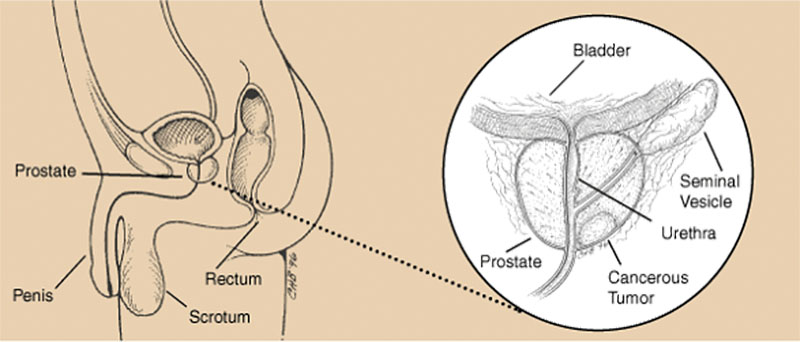 Cancer starts when cells in the body begin to grow out of control. Cells in nearly any part of the body can become cancer cells, and can spread to other areas of the body.
Cancer starts when cells in the body begin to grow out of control. Cells in nearly any part of the body can become cancer cells, and can spread to other areas of the body.
Prostate cancer begins when cells in the prostate gland start to grow uncontrollably. The prostate is a gland found only in males. It makes some of the fluid that is part of semen.
The prostate is below the bladder and in front of the rectum. The size of the prostate changes with age. In younger men, it is about the size of a walnut, but it can be much larger in older men.
Just behind the prostate are glands called seminal vesicles that make most of the fluid for semen. The urethra, which is the tube that carries urine and semen out of the body through the penis, goes through the center of the prostate.
 Types of Prostate Cancer
Types of Prostate Cancer
Almost all prostate cancers are adenocarcinomas. These cancers develop from the gland cells (the cells that make the prostate fluid that is added to the semen).
Other types of prostate cancer include:
• Sarcomas
• Small cell carcinomas
• Neuroendocrine tumors (other than small cell carcinomas)
• Transitional cell carcinomas
These other types of prostate cancer are rare. If you have prostate cancer it is almost certain to be an adenocarcinoma.
Some prostate cancers can grow and spread quickly, but most grow slowly. In fact, autopsy studies show that many older men (and even some younger men) who died of other causes also had prostate cancer that never affected them during their lives. In many cases neither they nor their doctors even knew they had it.
Signs and Symptoms of Prostate Cancer
Early prostate cancer usually causes no symptoms. More advanced prostate cancers sometimes cause symptoms, such as:
• Problems urinating, including a slow or weak urinary stream or the need to urinate more often, especially at night
• Blood in the urine or semen
• Trouble getting an erection (erectile dysfunction or ED)
• Pain in the hips, back (spine), chest (ribs), or other areas from cancer that has spread to bones
• Weakness or numbness in the legs or feet, or even loss of bladder or bowel control from cancer pressing on the spinal cord
Most of these problems are more likely to be caused by something other than prostate cancer. For example, trouble urinating is much more often caused by benign prostatic hyperplasia (BPH), a non-cancerous growth of the prostate. Still, it’s important to tell your health care provider if you have any of these symptoms so that the cause can be found and treated, if needed.
Tests for Prostate Cancer
Most prostate cancers are first found during screening with a prostate-specific antigen (PSA) blood test or a digital rectal exam (DRE). Early prostate cancers usually don’t cause symptoms, but more advanced cancers are sometimes first found because of the symptoms they cause.
If cancer is suspected based on results of screening tests or symptoms, tests will be needed to confirm the diagnosis. The actual diagnosis of prostate cancer can only be made with a prostate biopsy.
—Courtesy of the American Cancer Society



































